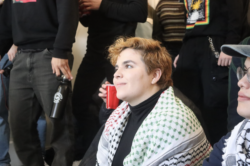Georgetown is hosting a program for a small group of students from Afghanistan this week, continuing its involvement in U.S. Afghan relations. The Afghan students arrived last Friday for a week-long program entitled “Blueprint for the Future—Connecting Afghan and American College Students,” where they are working with Georgetown students to draft a document on Afghanistan’s redevelopment.
Students attended class, visited the White House, the State Department and the Capitol and had the option of attending a men’s basketball game, among other activities in the program, which was developed by the College Academic Council.
Originally ten Afghan students were expected to attend the week’s events, but only six were able to gain government clearance, according to Vice President for Student Affairs Juan Gonzalez. Ten Georgetown students also participated in the program.
The students from Afghanistan all attend Kabul University, according to a list of participant biographies released on Jan. 23. Several of the Afghan students live and study in the United States.
The female students were forced to leave Kabul University when the Taliban came to power. Nazifa Sarvey had to abandon her studies in Kabul University’s English Department, according to her biography.
“After studying three semesters, the government changed and I stayed at home for five years. During this time the Afghan situation wasn’t good for education—especially for women,” Sarvey said.
Sarvey and many other female students returned to Kabul University after the defeat of the Taliban, she said.
Georgetown students participating in the program declined to comment until the program ends.
Nazareth Haysbert (CAS ‘05), a participant who is involved in the Georgetown University Student Association and the International Relations Club, expressed his enthusiasm in the participant biographies.
“I am excited at the prospect that America can assist and participate in the formation of a credible nation that while undergoing a process of change in political values and societal norms is rebuilding from the ground up,” Haysbert said.
Last January, the University hosted Afghan President Hamid Karzai, then chairman of the interim government, who gave a nationally televised speech on bringing democracy and stability to Afghanistan. Over 3,000 people attended the speech.
Over the summer, Georgetown hosted the Afghanistan-America Summit on Recovery and Reconstruction, with top Afghan and U.S. officials attending. The summit, which focused on health, education, trade, development and family, was the first meeting of Afghan and U.S. officials in the United States.




